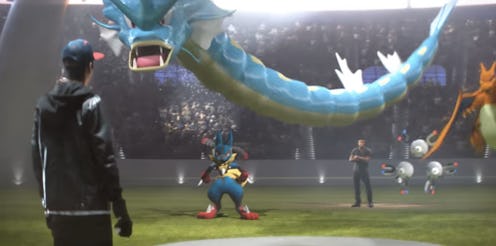Entertainment
So Is Pokémon Still, Like, A Thing?

Ever since I picked up the solid gold CD 2. B. A Master I've been wondering: "do we all live in a Pokémon World?" It's something to consider upon the franchise's 20th anniversary, especially with an intense Pokémon Super Bowl 50 commercial urging us to "train on." There's a lot of hype (and potentially a new game) coming with this anniversary, and those who are culturally out of the loop may ask: well, is Pokémon still popular in 2016? And, my friends, that is a loaded question. Let's break it down.
Obviously, Pokémon got it's official debut in 1996 (see, 20 years) with Red and Green (which did not make it across our waters) versions. Most of you millennials in the audience will remember that Pokémon became an international fad around ballpark '97 and '98. I remember when the first Pokémon movie hit theaters in 1999; the franchise had become a full-blown frenzy, with lines bleeding hard out of the door. The late '90s were Pokémon's peak, and all of us tweens were gunning to become Pokémon masters. At some point, though, mainstream interest faded, and most of us just found out one day in 2016 that there are upwards of 721 Pokémon out there, and one of them is literally an ice cream cone.
OK, let's get to the hard facts: the numbers. Now, obviously Pokémon has branched out into many different mediums besides video games (as is the nature of a franchise), but, since the Super Bowl ad looks like it's going to promote something in that direction, we can go forth and examine cartridge sales. To date, the OG Red, Blue, and Green versions sold about 31.38 million units. Granted, those games are lumped together in threes, but the continuing numbers are still formidable. Pokémon Yellow sold 14.64 million units on its own (obviously, it's the best one), while Silver and Gold versions sold 23.10 million units. From there, though, the numbers sort of slow down, plateauing at an average of 12 or 13 million (and non-Gameboy games in the millions). Still so impressive, but the point is that the Silver and Gold era was Pokémon's last moment of global popularity. From there on out, it seems to be mostly tried-and-true fans re-investing.
But those are numbers; that isn't popularity. Let's consider something else, from a societal point of view. Millennial culture is so strongly based on a love of nostalgia and a reverence of the things we grow up with, and a love of Pokémon is almost universal between people around my age. It's nearly like Harry Potter, in that it became an important part of our childhood, and you want to keep those feelings going. From that perspective, the nostalgic perspective, Pokémon is still very much alive to people. The debate over whether Ash or Brock is hotter is now a valid conversation, because of how my generation repurposes our favorite old pieces of pop culture. On a similar note, there are 62 and counting Pokemon memes, caused by how recognizable the franchise was, which will be keeping the franchise in a very public, very viral, very constant eye for years to come.
Is Pokémon still popular in a modern context? Not exactly. But what Pokémon has become is a universally recognizable pop culture force, kept alive in part only in the memories of retro-loving 20-somethings. It's something akin to The Simpsons: even though it's not the wildfire craze that it was in the early '90s, it's iconic, a constant sound in the background noise of our lives. It's hard for me to look you in the eyes and say that Pokémon (outside of Japan) is so popular, and everyone totally owns a Vanilluxe stuffed toy in the apartment. It's no longer a trend. It's an institution.
Short version: Pokémon is doing perfectly fine, and you should definitely check out the promo below. And who knows? Maybe by the time the Super Bowl is over, we'll all want to become trainers again.
Images: Giphy (2); TheOfficialPokemonChannel/YouTube